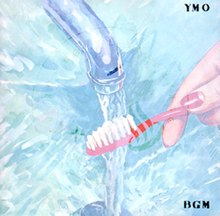BGM (album)
| BGM | ||||
|---|---|---|---|---|
 |
||||
| Studio album by Yellow Magic Orchestra | ||||
| Released | March 21, 1981 | |||
| Recorded | 1981 | |||
| Studio | Alfa Studio “A”, Shibaura, Minato, Tokyo | |||
| Genre | ||||
| Length | 47:06 | |||
| Label | ||||
| Producer |
|
|||
| Yellow Magic Orchestra chronology | ||||
|
||||
| Singles from BGM | ||||
|
||||
| Professional ratings | |
|---|---|
| Review scores | |
| Source | Rating |
| AllMusic | |
| Stereo Review | unknown |
BGM is the fourth studio album by Yellow Magic Orchestra, released on March 21, 1981. The title stands for "Background music". This album was produced by Haruomi Hosono. YMO was the first band to use the Roland TR-808 Rhythm Composer, one of the first programmable drum machines, as early as 1980. In early 1981, they released BGM, as their first studio album recorded with the Roland MC-4 Microcomposer and TR-808.
Alfa Records, YMO’s record company, had installed a 3M 32-track digital recorder in its studio shortly before YMO started recording BGM. Since Hosono was not fond of its overly sharp sound quality, he recorded all the rhythm sections for BGM on a TASCAM 80-8 analog recorder first and copied them with the 3M machine, resulting in the fuller, much compressed rhythm tracks. Unfortunately, no known working samples of the 3M recorder exist in Japan today, making it quite difficult to play the master tape.
One of the earliest uses of the TR-808 for a live performance was by Yellow Magic Orchestra in 1980 for the song "1000 Knives", an electro rendition of member Ryuichi Sakamoto's "Thousand Knives" (1978). The hand-clap sound was later publicized by YMO's innovative album BGM, used again on "1000 Knives" and in "Music Plans", another of Sakamoto's songs.
Peter Barakan debuts as YMO’s co-lyricist. Ryuichi Sakamoto was often absent from the BGM recording sessions, and he turns in "Music Plans" as his only new composition for the album, since "1000 Knives" (from his 1978 debut album The Thousand Knives of Ryuichi Sakamoto) and "Happy End" were new recordings of his earlier materials. Another song, "Rap Phenomena", was an early attempt at electronic rap. "Loom" is a re-working of "The Infinite Space Octave" by YMO computer programmer Hideki Matsutake, and features a slow, upward glissando similar to the Deep Note, THX's audio logo. A similar sound was previously used by YMO members Haruomi Hosono and Ryuichi Sakamoto for their 1978 album Cochin Moon. Like most YMO albums, song titles were printed in both Japanese and English, as listed below. "来たるべきもの" more accurately translates to "What should come".
...
Wikipedia
